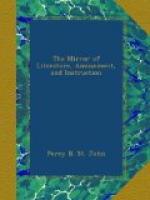Poiet. I have often seen sea-gulls assemble on the land, and have almost always observed that very stormy and rainy weather was approaching. I conclude that these animals, sensible of a current of air approaching from the ocean, retire to the land to shelter themselves from the storm.
Ornither. No such thing. The storm is their element; and the little petrel enjoys the heaviest gale, because, living on the smaller sea-insects, he is sure to find his food in the spray of a heavy wave—and you may see him flitting above the edge of the highest surge. I believe that the reason of this migration of sea-gulls, and other sea-birds, to the land, is their security of finding food; and they may be observed, at this time, feeding greedily on the earth-worms and larva, driven out of the ground by severe floods: and the fish, on which they prey in fine weather in the sea, leave the surface and go deeper in storms. The search after food is the principal cause why animals change their places. The different tribes of the wading birds always migrate when rain is about to take place; and I remember once, in Italy, having been long waiting, in the end of March, for the arrival of the double snipe in the Campagna of Rome, a great flight appeared on the 3rd of April, and the day after heavy rain set in, which greatly interfered with my sport. The vulture, upon the same principle, follows armies; and I have no doubt that the augury of the ancients was a good deal founded upon the observation of the instincts of birds. There are many superstitions of the vulgar owing to the same source. For anglers, in spring, it is always unlucky to see single magpies,—but two may be always regarded as a favourable omen; and the reason is, that in cold and stormy weather, one magpie alone leaves the nest in search of food, the other remaining sitting upon the eggs or the young ones; but when two go out together, it is only when the weather is warm and mild, and favourable for fishing.
Poiet. The singular connexions of causes and effects, to which you have just referred, make superstition less to be wondered at, particularly amongst the vulgar; and when two facts naturally unconnected, have been accidentally coincident, it is not singular that this coincidence should have been observed and registered, and that omens of the most absurd kind should be trusted in. In the west of England, half a century ago, a particular hollow noise on the sea-coast was referred to a spirit or goblin, called Bucca, and was supposed to foretell a shipwreck: the philosopher knows that sound travels much faster than currents in the air, and the sound always foretold the approach of a very heavy storm, which seldom takes place on that wild and rocky coast without a shipwreck on some part of its extensive shores, surrounded by the Atlantic.
Phys. All the instances of omens you have mentioned are founded on reason; but how can you explain such absurdities as Friday being an unlucky day, the terror of spilling salt, or meeting an old woman? I knew a man of very high dignity, who was exceedingly moved by these omens, and who never went out shooting without a bittern’s claw fastened to his button-hole by a riband, which he thought ensured him good luck.




